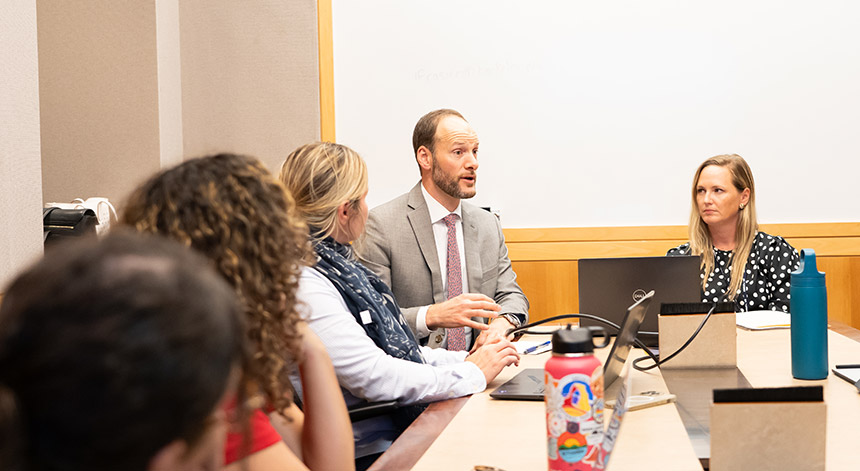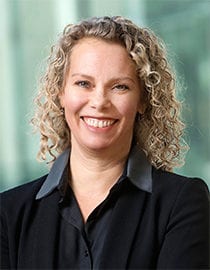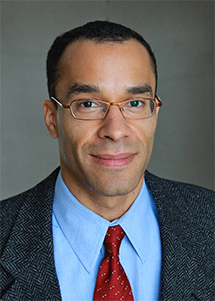
By Gwyneth K. Shaw
Berkeley Law’s smorgasbord of fall courses includes some innovative new dishes for students with interests ranging from criminal justice reform to California climate policy to international equality.
Drawing on both expert lecturers — often highly-skilled and experienced practitioners — and the school’s powerhouse full-time faculty, these courses complement the existing curriculum and push it forward.

For example, award-winning attorney and public policy expert Norma P. Garcia is teaching Legislative Advocacy, which covers the practical components and considerations necessary to successfully advance a bill from an idea to statutory law. Center for Law, Energy & the Environment Executive Director Louise Bedsworth is joining forces with Cliff Rechtschaffen, a longtime climate adviser in the state now serving on the California Air Resources Board, to teach California Climate Law and Policy.
Professor Laurel Fletcher, who just stepped away from the Human Rights Clinic to develop her own clinical offering beginning in the spring semester, created the Human Rights Futures: New Directions in Law and Practice course. It explores how the global human rights movement is transforming as it confronts unprecedented challenges to an international system that was built for the last century.

Professor David B. Oppenheimer, who directs the Berkeley Center on Comparative Equality and Anti-Discrimination Law, is teaching a two-semester Comparative Equality course. The first semester is being taught on Zoom and includes law students and faculty from 15 universities, with representation from North America, South America, Asia, Africa, Australia, and Europe. The second semester is an in-person class at Berkeley Law.
“Once again, our wonderful faculty have produced a remarkable mix of classes covering topics relevant to practice areas old and new,” Professor and Associate Dean for J.D. Curriculum and Teaching Jonathan D. Glater says. “We have exciting new offerings related to climate law, leadership, and legislative advocacy. As happens every year, I find myself wishing I could be a law student again, to take advantage of these kinds of classes.”
Local opportunities
The offerings also include a new experiential course: the Postconviction Resentencing Practicum and Seminar, taught by Criminal Law & Justice Center Executive Director Chesa Boudin and center Staff Attorney Andrea Crider. In 2019, California legislators passed a law allowing for “prosecutor-initiated resentencing,” giving prosecutors the discretion to review old cases and recommend lower sentences.
Boudin says when he was San Francisco District Attorney, he could see that most offices like his didn’t have the resources to give cases the consideration they deserved. In the new course, Berkeley Law students will work with the Alameda County District Attorney and do that work.

“The idea for this course stems from the resentencing work my team did in the San Francisco DA office and a recognition that this urgent work can be accomplished with the energy and vision of the next generation of lawyers,” he says. “With student power, we’ll be able to help the Alameda County District Attorney review a backlog of ripe cases ready for resentencing, and ultimately help save the state money by reducing decades of unnecessary incarceration.”
Students had to apply for the course, and Crider says that while she and Boudin valued applicants with lived or impacted experience in the system, they also wanted to be a gateway for those who may be new to this type of work “in the hope that it leads to lifelong commitments to advancing justice.”
There are big obstacles in these cases, Boudin says. Many are years or decades old, and their victims either dead or difficult to find. The victim’s perspective is essential to the work, he adds, and they have a right to know about any sentencing changes and voice their opinion if they choose.
In addition, the bureaucratic and political climate also pose hurdles.
“It will be a challenge to work with students on navigating the serious nature of the offenses, victims’ rights, and the interests of justice, all in a political climate made toxic by big money donors who, too often, seek to recall elected officials before they have a chance to follow through on campaign promises to the voters who elect them,” Boudin says.
Even facing those headwinds, students will have a unique opportunity to review real-life cases and help make meaningful decisions in resentencing incarcerated individuals, Crider says.
“In my opinion as a former public defender, everyone should do post conviction work at some point in their career because reviewing the records, getting to know a case and the root causes of the crime, and witnessing that redemption and rehabilitation are real, will make you a better attorney on the front end of whatever you may choose to do,” she says.